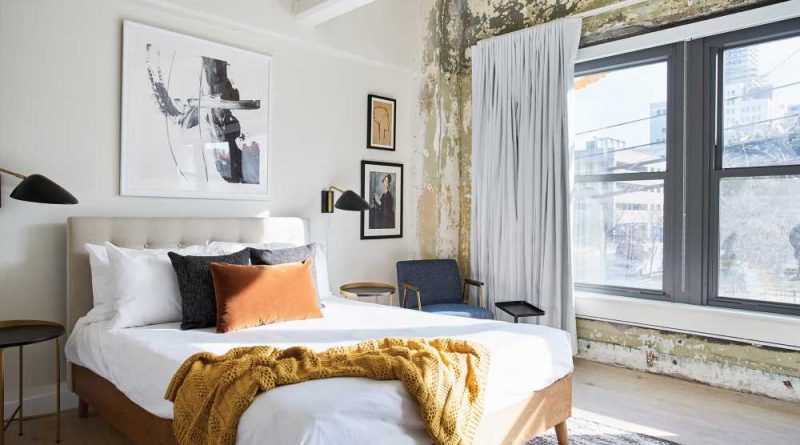Will standardized rentals work for business travelers?
There are still so many unknowns about the recovery roadmap for corporate travel. Covid variants, vaccination debates, mask mandates and continued unease leave a cloud of uncertainty lingering for companies and individuals around the world.
The greatest ambivalence relates to the near-term outlook, with more consensus that long-term — while the road will be uneven — corporate travel will return and be more like than unlike what it was pre-pandemic.
According to Phocuswright’s U.S. Corporate Travel Report 2020-2024, gross bookings in the United States will grow to $121 billion by 2024, which would be 91% of 2019 levels.
As business travel does pick up, one trend that seems likely to continue is the development of more nontraditional lodging options for corporate travelers – spurred in part by demand for longer stays in more “home like” properties and by the fact more consumers have sampled alternative supply during the pandemic and are now more likely to consider it for work.
According to Phocuswright, more than half of U.S. travel managers say short-term rentals are allowed in their company’s policy, double the share in 2017.
Sonder’s sales strategy
San Francisco-based startup Sonder is one of the companies hoping to capture some of that interest. Pre-pandemic, Sonder’s vice president of sales Kristen Richter says the company’s business was 80% leisure, 20% corporate.
Now Sonder is boosting the visibility of its properties to travel managers with its recent announcement that it is distributing rates and inventory to Amadeus, Sabre and Travelport through a third-party distribution connectivity partner. Also, Sonder is integrated with TripActions and Egencia, with plans for more travel management company partnerships in the works.
The announcement follows Sonder’s news in April of plans to go public through a merger with special purpose acquisition company Gores Metropoulos II with an expected valuation of $2.2 billion. And it comes ahead of the annual corporate travel request-for-proposal process this fall, when companies will line up plans for the coming year.
Related stories
- Travel companies find opportunities in crisis
- Hotel rooms as workspaces? It’s happening
- Traditional hotels looking over their shoulders
“We are on the shelf, we are participating in the annual RFP process this year for 2022 — that’s a huge milestone for Sonder, for any short-term rental company to be honest … and we’re the first company to participate in that process with our inventory in the GDSs,” Richter says.
“We know that the three most important things on travelers’ minds are cleanliness, location and affordability. Those three things mixed with Sonder’s product — which is spacious, most of the time has kitchens, a washer and dryer — all of that combined is what corporate travelers are looking for right now. So it is a bit serendipitous that Sonder’s inventory is here right now.”
Sonder currently offers apartments and hotel rooms in 35 cities in nine countries, with an app that enables guests to manage things like booking, check-in and check-out, Wi-Fi and interactions with the company’s local support teams.
Business travelers want consistency
TripActions’ chief travel officer Daniel Finkel says along with these types of technological solutions, Sonder appeals to his clients because it offers a uniform experience for travelers related to things such as hygiene protocols, in-room amenities, building security and check-in.
“I think there has been a strong resistance with a lot of travel managers to move into allowing their travelers to use what I would call alternative accommodations because there wasn’t this consistency,” Finkel says.
“I definitely think that there is going to be increased interest in the standardized alternative accommodations. I actually would question whether there’s going to be an increase in the nonstandardized alternative accommodations because of this notion of increased scrutiny on health and safety and cleanliness and all of the things that are necessary in the Covid world.”
While Finkel says TripActions has thousands of alternative lodging options on its platform through its connections to online travel agencies, this integration with Sonder will give its listings greater visibility through badging as a “preferred partner” and displays that highlight the amenities and benefits of its properties.
But Finkel says more work is needed from his company and other corporate travel intermediaries to clarify the differences among accommodation options.
“The problem is in the OBTs and the TMCs — the ability to call out those partners that have done a good job of standardization and having the UI and UX to call out what is included, what is not included, why one company partner group would be suitable to business travelers while another might not be suitable. I think that’s where the innovation still really needs to happen,” he says.
Festive Road managing partner Paul Tilstone agrees detailed content about security, support services, property quality, etc., is critical for travel managers who are considering alternative accommodations — something he expects to increase coming out of the pandemic.
“What we’re hearing is travel managers saying that while the number of trips is likely to reduce long term, the length of stay — especially for long haul — is likely to increase in order to create more purposeful, more sustainable, more valuable trips and this plays to accommodation which is more of a home away from home,” Tilstone says.
“One particular travel manager told me in a recorded interview recently that interest in apartment services has risen from 18% to 32% in a matter of just six months or so.”
Next steps: Size, scale, brand recognition
Sonder is not the first supplier to ink a partnership with TMCs. In February 2020 American Express Global Business Travel became a distribution partner for Mint House, a startup with apartment-style accommodations targeted to business travelers, adding the company to its Rest Assured Solutions platform.
GBT’s vice president for hotels, Wes Bergstrom, says the standardized accommodations offered by Mint House, Sonder and others are the subset of alternative accommodations that can work for corporate travel.
“I think when you look at the world of HomeAway [Vrbo] or Airbnb, there’s just so much supply. It’s unique, and that’s perfect for a leisure traveler and so forth, but when you are going on a business trip you have to have some standards. And that’s where this segment… makes a lot of sense,” he says.
“That’s why business travelers have liked certain [hotel] brands over time — it’s because they know what they are going to get each and every time.”
But efforts from suppliers such as Sonder to put inventory in the GDSs and directly integrate with TMCs is just part of what it will take for alternative accommodations to gain more share of the corporate travel market.
“There has to be enough size and scale within some of these to make them relevant to corporate travel programs. If you only have 30 rooms in a city, how appealing is that to corporations that have large blocks of people going to different places?” Bergstrom says.
“And in a lot of cases the traveler still has some say in where they stay, and I think most travelers still don’t know about these brands… so it’s really getting the name out there, the recognition, what they do, why they’re different, what’s interesting for the traveler versus staying in something they’ve been staying in for a long time.”
And Bergstrom says innovation is needed in mobile solutions that serve this space to streamline the experience, from booking through stay, for the traveler.
“That’s kind of the next wave — looking at how that technology comes together. Today you might need to have multiple apps. In future if you can have it all in one place, that’s going to make that experience so much better for the traveler,” he says.
___
Source: PhocusWire
Source: Read Full Article



